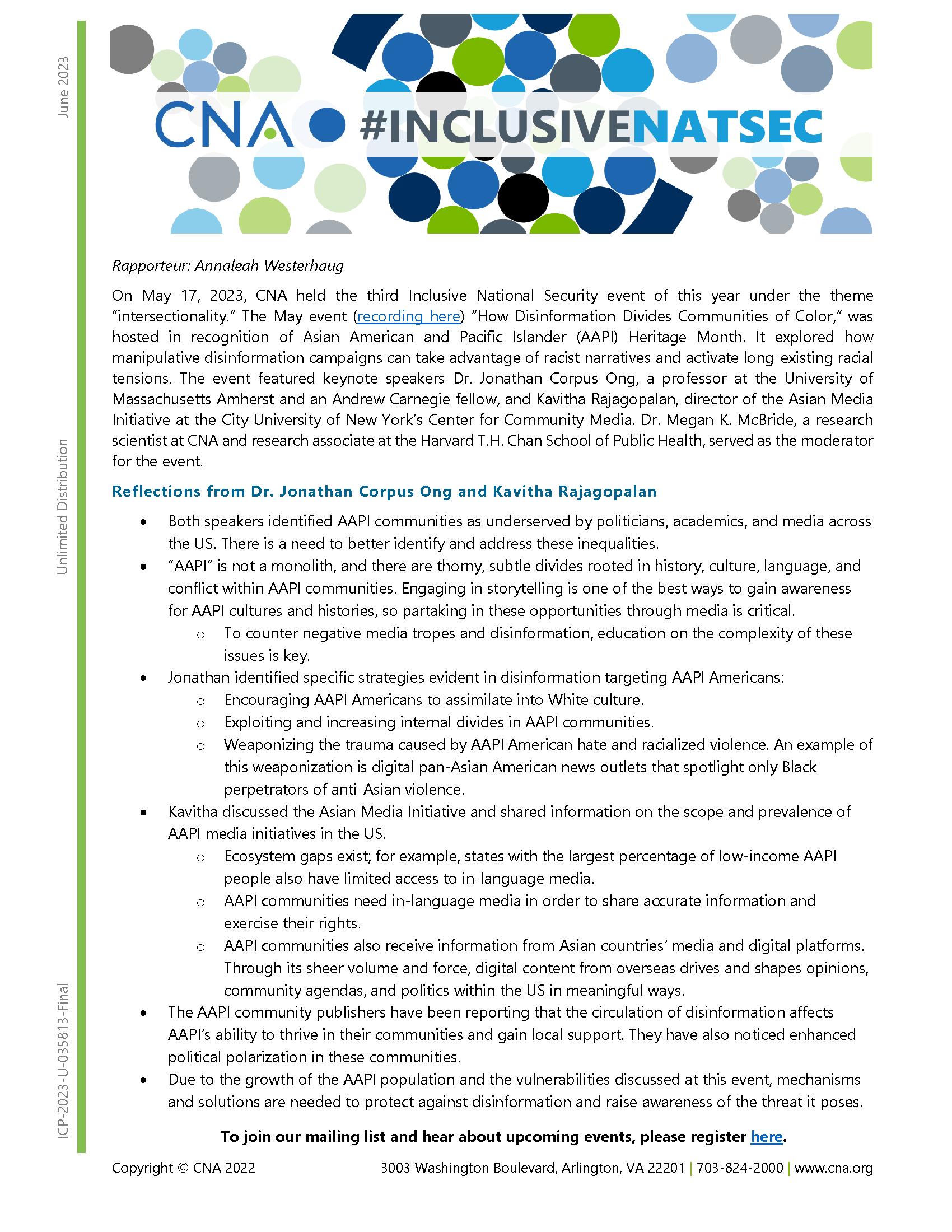Inclusive NatSec May 2023
On May 17, 2023, CNA held the third Inclusive National Security event of this year under the theme “intersectionality.” The May event, “How Disinformation Divides Communities of Color,” was hosted in recognition of Asian American and Pacific Islander (AAPI) Heritage Month. It explored how manipulative disinformation campaigns can take advantage of racist narratives and activate long-existing racial tensions. The event featured keynote speakers Dr. Jonathan Corpus Ong, a professor at the University of Massachusetts Amherst and an Andrew Carnegie fellow, and Kavitha Rajagopalan, director of the Asian Media Initiative at the City University of New York’s Center for Community Media. Dr. Megan K. McBride, a research scientist at CNA and research associate at the Harvard T.H. Chan School of Public Health, served as the moderator for the event.
Reflections from Dr. Jonathan Corpus Ong and Kavitha Rajagopalan
- Both speakers identified AAPI communities as underserved by politicians, academics, and media across the US. There is a need to better identify and address these inequalities.
- “AAPI” is not a monolith, and there are thorny, subtle divides rooted in history, culture, language, and conflict within AAPI communities. Engaging in storytelling is one of the best ways to gain awareness for AAPI cultures and histories, so partaking in these opportunities through media is critical.
- To counter negative media tropes and disinformation, education on the complexity of these issues is key.
- Jonathan identified specific strategies evident in disinformation targeting AAPI Americans:
- Encouraging AAPI Americans to assimilate into White culture.
- Exploiting and increasing internal divides in AAPI communities.
- Weaponizing the trauma caused by AAPI American hate and racialized violence. An example of this weaponization is digital pan-Asian American news outlets that spotlight only Black perpetrators of anti-Asian violence.
- Kavitha discussed the Asian Media Initiative and shared information on the scope and prevalence of AAPI media initiatives in the US.
- Ecosystem gaps exist; for example, states with the largest percentage of low-income AAPI people also have limited access to in-language media.
- AAPI communities need in-language media in order to share accurate information and exercise their rights.
- AAPI communities also receive information from Asian countries’ media and digital platforms. Through its sheer volume and force, digital content from overseas drives and shapes opinions, community agendas, and politics within the US in meaningful ways.
- The AAPI community publishers have been reporting that the circulation of disinformation affects AAPI’s ability to thrive in their communities and gain local support. They have also noticed enhanced political polarization in these communities.
- Due to the growth of the AAPI population and the vulnerabilities discussed at this event, mechanisms and solutions are needed to protect against disinformation and raise awareness of the threat it poses.
Unlimited Distribution
Details
- Pages: 1
- Document Number: ICP-2023-U-035813-Final
- Publication Date: 6/12/2023
